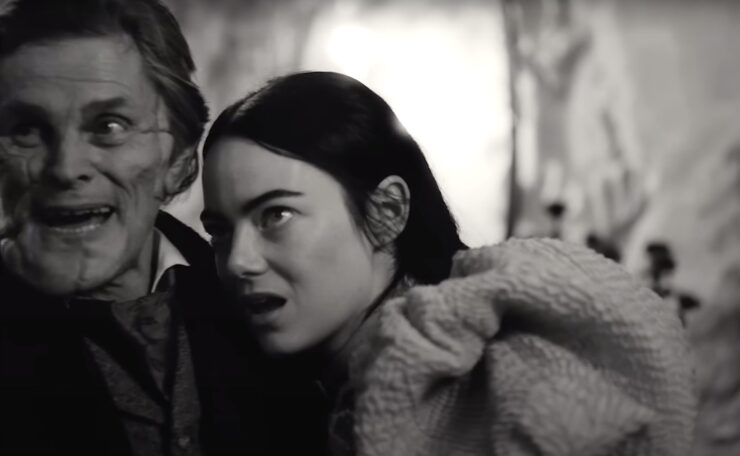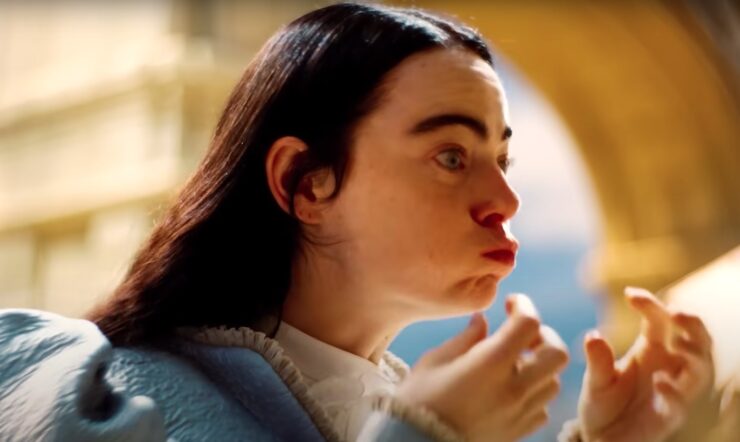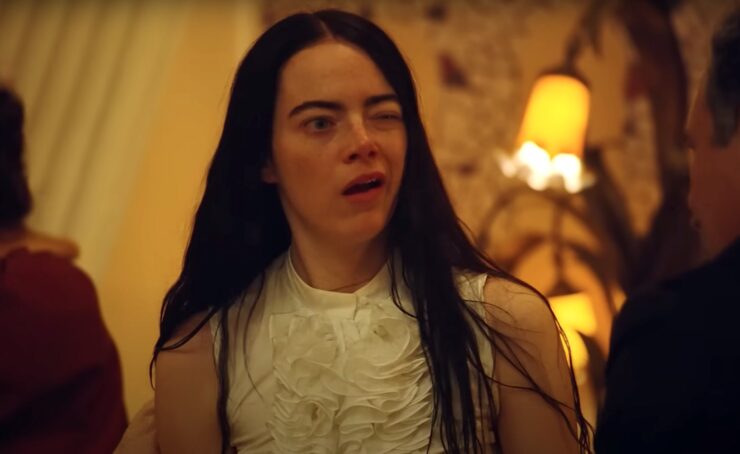Poor Things is a blast. I’m not sure if everyone will like it, but everyone should like it. This world would be a better place if this kind of movie could do Barbenheimer numbers.
The film is a phantasmagorical bildungsroman, which is my fancy way of saying that it happens in a somewhat alternate Europe where their reality is a bit skewed from our own, and we follow a young person going on an adventure of self-discovery.
Poor Things is based on the novel Poor Things: Episodes from the Early Life of Archibald McCandless M.D., Scottish Public Health Officer by Alasdair Gray, which I confess I have not read—but I really want to now. From what I know of the novel, however, screenwriter Tony McNamara and director Yorgos Lanthimos have taken things in a different direction, kept the focus entirely on Bella Baxter rather than giving much time to her husband, and made it more fantastical and less Scottish.
Emma Stone plays Bella Baxter (or, rather, inhabits the goddamn astonishing creation that is Bella Baxter) Willem Dafoe plays her… I’m going to go with father?… a somewhat mad scientist named Godwin Baxter, who ends up being called “God” pretty often, which leads to fun theological humor. (My favorite!) Mark Ruffalo is Duncan Wedderburn and Ramy Youssef is Max McCandles, wildly opposite suitors of Bella Baxter. They’re both fantastic, but I don’t think I’ve ever seen better work from Ruffalo. Kathryn Hunter is amazing as Bella Baxter’s, um, mentor, Madame Swiney, and Jerrod Carmichael sweeps in like some Golden Age of Hollywood actor with mannered language and high wire philosophy as Harry Astley.

Bella Baxter is kind of a Frankenstein’s Creature riff: for reasons I won’t spoil she starts out childlike, but develops rapidly intellectually. Over the course of the film a number of men try to claim her as theirs in one way or another, and she resists this in ways that are sometimes hilarious and sometimes poignant. The patriarchal bullshit is usually played for absurdist and/or dark humor. There is a lot of gross-out stuff, and the film affords me an opportunity to use the word VISCERA which is always welcome.
VISCERA.
Quite a lot of it.
And it’s gross in the Gargantua and Pantagruel way, where it revels in the disgusting things the human body can do. The costume design and sets are beautiful and off-kilter in ways that work without falling into weirdness for its own sake. When there are metaphors and allegories they all land. There’s a dance scene that’s one of the funniest things I’ve ever seen in my life. Sex is used in really interesting ways instead of the usual boring ones. The movie is happily political cause everything is political. If I had a daughter I would make damn sure she watched this as soon as she was ready.
In a lot of ways, Poor Things is what I wanted Barbie to be.
Don’t get me wrong, I enjoyed Barbie for what it was, but Poor Things is like if the Weird Barbie that was played with too hard was like, “Let’s play even harder” and set off on an adventure full of sex and intellectual trapeze stunts.
I’ll say the thing everyone’s said and tell you that Emma Stone’s performance defies my attempts to describe it. People keep saying “unhinged” or “brave”, and yes, but it isn’t even just that, it’s like she found the purest form of “I don’t give a FUCK if you don’t like it” and put that into every second she’s on film. Every muscle spasm, every eyebrow cock, there wasn’t an instant when she wasn’t Bella Baxter.

And about that name, Bella Baxter.
As the film rolls on, and he becomes ever more herself, she says her name more and more often. At first, she says “Bella” in the third person, the way a toddler says their own name. But each time she says it it’s with more strength, and at a certain point she add Godwin’s last name, “Baxter”. From then on the two names are said as one conjoined twin, in one breath. The name becomes a mantra, a prayer, a cri de cœur, a statement of purpose, a brick wall. I don’t think I’ve ever seen a movie where a woman said her own name so often. I fucking loved hearing it.
There’s a lot of sex. A lot. Which is the part where my mind walks down two roads, and I have to tell you about both of them.
I think movies need more sex. I think this weird backlash of the last few years, and the frustrating sexless MCU movies, is bad for cinema. I also think it’s a (non-lubricated, ill-fitting) Trojan horse striking against woman’s rights, queer rights, the societal acceptance of bodily autonomy, joy, freedom, and fun for fun’s sake. I think the fact that this happened just as the #MeToo and #TimesUp movements were finally holding abusers accountable, and ushering in an era when intimacy consultants could actually foster respectful and safe sex scenes in film, is, um, odd. I think this all coming after decades of regressive forces dismantling all the societal progress we made in this country, AND after marriage equality was finally established in what is supposedly a country founded on the idea of separation of church and state, and this happening in a climate where women are once again not full citizen of a country in which they are forced to pay taxes, is oh, I don’t know, suspect. (But why listen to me, I’ve only studied the rise of the religious right for my entire adult life.) The part of my brain on that path loved every leaking sweating fluid-dripping slutty second of Poor Things.

The other path, which I also agree with, was frustrated that (as in Barbie!) a woman’s autonomy was primarily express through sex. Now, Bella Baxter does also develop a lively intellectual life, but it gets far less screentime than all the joyous fucking. And I am little tired of seeing that “women’s liberation = having sex a lot” because what of the women who don’t care about sex? And what of the women who want to be defined more by their mental and creative pursuits than what they do with their bodies? Their brains are also part of their bodies, yes? But I guess no one ever wrote Our Brains, Ourselves, so here we are.
Now again this is not a knock on the movie. It does make it clear that Bella Baxter values her mind—and eventually forces the men around her to do so as well, even when they don’t much want to. But I was left wishing for more scenes of reading and talking, especially between Bella Baxter and Suzy Bemba’s fabulous Toinette.
But also! This movie contains multitudes, and I want to make it clear after my one (infinitesimal) ding that you owe it to yourself to see this movie, in the theater if it’s safe for you, preferably with people you’ll have vigorous conversations with after the credits roll.










